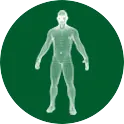

Symptoms
- Chest pain or discomfort, also known as angina, which is caused by a reduction in blood flow to the heart muscle
- Shortness of breath, especially with exertion or during physical activity
- Fatigue, especially during physical activity
- Heart palpitations, which are irregular or forceful heartbeats
- Swelling in the legs, ankles, and feet, caused by a buildup of fluid due to heart failure
- Lightheadedness or fainting, which can be caused by a lack of blood flow to the brain
- Coughing and wheezing, which can be caused by lung conditions such as lung cancer, emphysema, or bronchiectasis.
- Hoarseness, which can be caused by voice box paralysis or nerve damage from lung surgery.
- Chest pain or discomfort, which can be caused by thoracic aortic aneurysm
It’s important to note that some people may have no symptoms and only found out they have a condition during a routine check-up or screening test. Therefore, it’s important to consult a specialist to evaluate the severity of the symptoms and the need for surgery.











